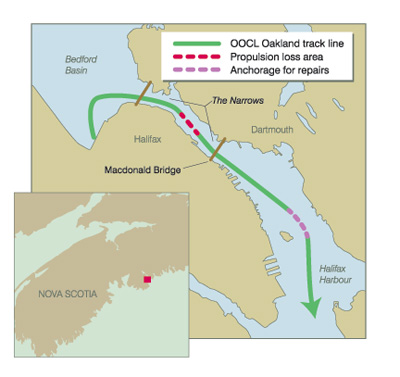A propulsion casualty involving a containership has prompted the Port of Halifax to review safety procedures for ship escorts, including the potential need for mandatory stern tether lines.
The 919-foot OOCL Oakland lost propulsion three times on the morning of Nov. 5, 2013, in a stretch known as “the Narrows” near Halifax Harbour. The Panamanian-flagged box ship was transiting from a berth at Bedford Basin, headed out to sea.
Officials said the ship sustained a loss of power to the main engines — three times in rapid succession — while passing the Nova Floating Dock on its starboard side and Pier 9 on its port side. The area lies between two suspension bridges that connect Dartmouth and Halifax.
To prevent OOCL Oakland from drifting toward one of the Angus L. Macdonald Bridge’s columns, the escorting tug Atlantic Oak secured a tether on the ship’s stern. Two other escort tugs connected lines forward. The powerless vessel was guided to a temporary safe haven at anchorage No. 1 in the inner harbor, where the ship’s crew investigated the loss of power and fixed the problem.
The incident resulted in no collision or injury. Still, the potential for a more serious accident prompted suggestions that stern tether lines should be mandatory during inbound and outbound transits in the Narrows. Lane Farguson, spokesman for the Halifax Port Authority, said the OOCL Oakland incident would be considered in an ongoing review of safety rules in the harbor.
The port authority “had undertaken a review of big-ship transits through the Narrows before the November incident,” Farguson said in February. “As part of our standard operating practice, issues relating to safety and safe harbor operation are regularly reviewed, tested and upgraded when necessary.”
In light of the November case, the port is “currently in the process of reviewing the results from that study in consultation with the Atlantic Pilotage Authority.”
According to the Canadian Coast Guard, OOCL Oakland was underway moving at 5 to 8 knots at 0212 when the first loss of power occurred. The ship still had some headway at the third outage of power at about 0222, according to data from PortVision. After the required repairs, OOCL Oakland was able to continue out to sea around 0320.
Officials never disclosed the cause of the propulsion loss or the repairs that were necessary. Coast Guard Marine Communications and Traffic Services produced an incident notification only.
Orient Overseas Container Line (OOCL), the charterer, said current safety rules were followed for the November transit in the Narrows. That included the use of a pilot and of escort tugs for maintaining the desired track and for berthing support.
“In terms of safe transits through narrow and restricted shipping lanes, OOCL complies with any requirements stipulated by local authorities which may differ from place to place,” said Stephen Ng, the company’s director of trades. “Safety is our priority and we encourage the use of any effective means and resources to ensure the safe operation of our vessels.”
The port’s current Practices and Procedures document provides the captain with some flexibility regarding how and whether escorts are deployed.
“The use of tugs is at the discretion of the master and with the concurrence of the pilot,” the document states. “Under some other special conditions relating to environmental protection, safety of navigation or safety of facilities or works, Halifax Port Authority may require that the vessel secure the services of a tug or tugs.”
Farguson offered no time frame for completion of the safety review, which may result in changes to the port’s written procedures.
“Our next step will be to share the findings with the Marine Advisory Committee made up of key port stakeholders,” Farguson said. “If it is determined that changes to the Practices and Procedures are warranted, we would then move forward in a consultative manner with stakeholders and marine users.”
Two interested parties, the Atlantic Pilotage Authority and Halifax Marine Towing, did not respond to requests for comment.

